被动语态虚拟语气
被动语态、虚拟语气 演示文稿

被动语态的用法 (1)不知道动作的执行者是谁。
Some new computers were stolen last night.
(2)没有必要或不愿意指出谁是动作的执行者。 Paper is made of wood.
(3)强调动பைடு நூலகம்的承受者,而不强调动作的执行者。 The window was broken by Mike. This book was written by him.
注意:1)主动语态变为被动语态,原句的时态、句式不变。 2)被动语态的谓语动词单复数随新主语的变化而变化 3)被动语态中的by短语,若by后为代词,要用宾格形式。
使用被动语态应注意的问题: 1.不及物动词(词组)不能用于被动语态: 常见的动词(词组)有happen, last, cost, appear, belong to,
3.一般将来时的被动语态构成:will/shall be+done A meeting will be held next Tuesday.
4.过去将来时的被动语态构成:would be+done She told us that those flowers would be moved to the park.
break out, take place ,consist of , add up to ,occur等,
The sweater cost me 80 yuan.
The war broken out in 1941. 2. 系动词不能用于被动语态: taste , feel , look , smell , sound ,
You should pay attention to your pronunciation.
高一英语直接引语和间接引语,被动语态,虚拟语气,定语从句语法知识总结和练习
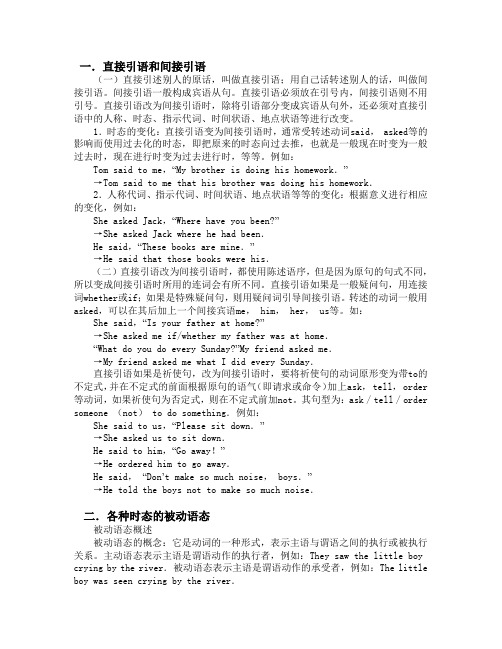
一.直接引语和间接引语(一)直接引述别人的原话,叫做直接引语;用自己话转述别人的话,叫做间接引语。
间接引语一般构成宾语从句。
直接引语必须放在引号内,间接引语则不用引号。
直接引语改为间接引语时,除将引语部分变成宾语从句外,还必须对直接引语中的人称、时态、指示代词、时间状语、地点状语等进行改变。
1.时态的变化:直接引语变为间接引语时,通常受转述动词said, asked等的影响而使用过去化的时态,即把原来的时态向过去推,也就是一般现在时变为一般过去时,现在进行时变为过去进行时,等等。
例如:Tom said to me,“My brother is doing his homework.”→Tom said to me that his brother was doing his homework.2.人称代词、指示代词、时间状语、地点状语等等的变化:根据意义进行相应的变化,例如:She asked Jack,“Where have you been?”→She asked Jack where he had been.He said,“These books are mine.”→He said that those books were his.(二)直接引语改为间接引语时,都使用陈述语序,但是因为原句的句式不同,所以变成间接引语时所用的连词会有所不同。
直接引语如果是一般疑问句,用连接词whether或if;如果是特殊疑问句,则用疑问词引导间接引语。
转述的动词一般用asked,可以在其后加上一个间接宾语me, him, her, us等。
如:She said,“Is your father at home?”→She asked me if/whether my father was at home.“What do you do every Sunday?”My friend asked me.→My friend asked me what I did every Sunday.直接引语如果是祈使句,改为间接引语时,要将祈使句的动词原形变为带to的不定式,并在不定式的前面根据原句的语气(即请求或命令)加上ask, tell, order 等动词,如果祈使句为否定式,则在不定式前加not。
英语成人高考复习-被动语态和虚拟语气

be型虚拟语气
2、表语从句中:
当主句主语为command , suggestion , demand ,order 等 (与1中动词同词根)以及idea , plan 等时(可用should + 动词原形代替;参见第十七章第三节“表语从句”)。 His order was that they (should ) stay where they were . 他的命令是他们呆在原地。
英语成人高考复习指导
基础知识复习-被动语态和虚拟 语气
Part1:被动语态和虚拟语气概述
英语动词除了时态,还有语态和语气的变化。
被动语态在英语中非常常见;
虚拟语气在现代英语中已趋于很少使用,《大纲》只 要求学生能读懂、理解虚拟语气的句子,不要求使用
。
Part2:被动语态
语态是表示句子的主语和谓语动词行为之间关系的
It is believed that he is right.
He is believed to be right.
大家相信他是对的。
被动语态的时态
一般过去时:
( He painted the wall white . →)
The wall was painted white . 墙油成了白色的。
be型虚拟语气
3、同位语从句中:
当其前为command , suggestion , demand , order 等(与1 中动词同词根)以及idea 等时(可用should + 动词原形代 替;参见第十七章第五节“同位语从句”)。 They received the order that they (should ) stay where they were. 他们得到命令让他们呆在原地。
助动词 用法大全
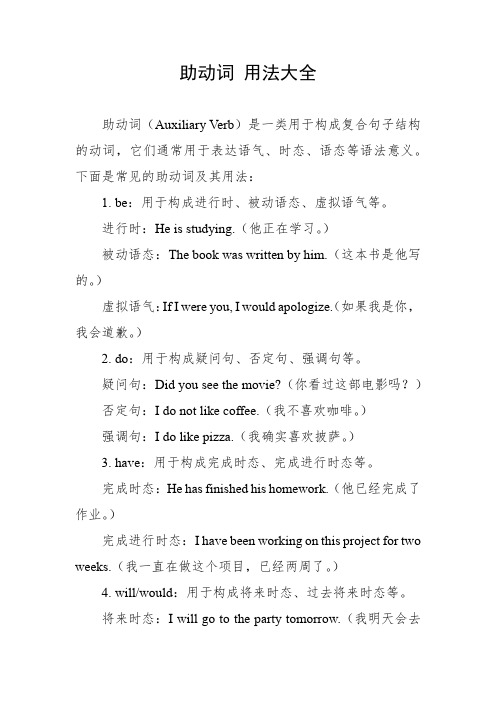
助动词用法大全助动词(Auxiliary Verb)是一类用于构成复合句子结构的动词,它们通常用于表达语气、时态、语态等语法意义。
下面是常见的助动词及其用法:1. be:用于构成进行时、被动语态、虚拟语气等。
进行时:He is studying.(他正在学习。
)被动语态:The book was written by him.(这本书是他写的。
)虚拟语气:If I were you, I would apologize.(如果我是你,我会道歉。
)2. do:用于构成疑问句、否定句、强调句等。
疑问句:Did you see the movie?(你看过这部电影吗?)否定句:I do not like coffee.(我不喜欢咖啡。
)强调句:I do like pizza.(我确实喜欢披萨。
)3. have:用于构成完成时态、完成进行时态等。
完成时态:He has finished his homework.(他已经完成了作业。
)完成进行时态:I have been working on this project for two weeks.(我一直在做这个项目,已经两周了。
)4. will/would:用于构成将来时态、过去将来时态等。
将来时态:I will go to the party tomorrow.(我明天会去参加聚会。
)过去将来时态:I would have gone to the party if I had been invited.(如果我被邀请,我本来会去参加聚会的。
)5. can/could:用于构成能力、请求、猜测等。
能力:I can swim.(我会游泳。
)请求:Could you help me with this?(你能帮我这个吗?)猜测:She might be coming late.(她可能会来晚。
)6. should/would:用于构成建议、假设等。
建议:You should take a break.(你应该休息一下。
英语被动语态(高中虚拟语气知识点总结)

原创不容易,【关注】店铺,不迷路!初中英语被动语态的特点及用法第一,被动语态的形式1.被动语态的基本时间变化被动语态通常是十时态的被动形式,由be的过去分词组成,be随着时态的变化而变化。
以do为例,各种时态的被动语态形式有:1)am/is/aredone(过去分词)一般现在时参观者请勿触摸展品。
2)已经/已经完成现在完成时这项任务的所有准备工作已经完成,我们准备开始了。
现在进行时这里正在建一座新电影院。
4)was/aredone简单过去式我有十分钟的时间来决定什么时候应该拒绝这个提议。
5)过去完成时到去年年底,北京又建成了一个新的东北。
过去进行时我在那里的时候,正在开会。
7)将来时如果工厂关闭,工作的孩子将会失去。
应该/将要做过去和将来时态消息一到达就会被发送给士兵的母亲。
9)将来应该/将要完成(很少使用)这个项目将在7月前完成。
2.被动语态的特殊结构形式1)带有情态动词的被动结构。
它的形式是:情态动词be过去分词。
婴儿应该由保姆好好照顾。
2)有些动词可以有两个宾语。
在被动结构中使用时,主动结构中的一个宾语可以变成主语,而另一个宾语保留在谓语后面。
通常成为主语的是间接宾语。
他妈妈送给他一份生日礼物。
可以改成他生日时妈妈送了他一份礼物。
3)“动词宾语补足语”的结构变成被动语态时,宾语变成被动结构中的主语,其余部分不动。
有人抓住了那个抽烟的男孩。
可以改成那个男孩抽烟被抓了。
4)当使役动词后面的不定式have、make、get和感觉动词see、watch、notice、hear、see、feel、observe用作宾语补足语时,主动结构中的不定式to应该省略,变成被动时再加。
有人看见一个陌生人走进大楼。
可以改成有人看见一个陌生人走进大楼。
5)有些相当于及物动词的动词短语,如“动词介词”、“动词副词”等,也可以用在被动结构中,但要作为一个整体,不能割裂开来。
介词或副词不能省略。
会议将推迟到星期五。
3.非谓语动词的被动语态动词(verb的缩写)ing形式和不定式do也有被动语态(一般时和完成时)。
语法被动语态虚拟语气宾语从句等
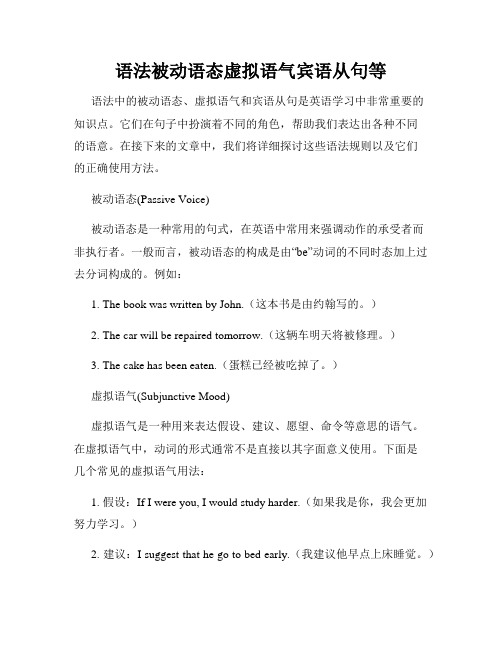
语法被动语态虚拟语气宾语从句等语法中的被动语态、虚拟语气和宾语从句是英语学习中非常重要的知识点。
它们在句子中扮演着不同的角色,帮助我们表达出各种不同的语意。
在接下来的文章中,我们将详细探讨这些语法规则以及它们的正确使用方法。
被动语态(Passive Voice)被动语态是一种常用的句式,在英语中常用来强调动作的承受者而非执行者。
一般而言,被动语态的构成是由“be”动词的不同时态加上过去分词构成的。
例如:1. The book was written by John.(这本书是由约翰写的。
)2. The car will be repaired tomorrow.(这辆车明天将被修理。
)3. The cake has been eaten.(蛋糕已经被吃掉了。
)虚拟语气(Subjunctive Mood)虚拟语气是一种用来表达假设、建议、愿望、命令等意思的语气。
在虚拟语气中,动词的形式通常不是直接以其字面意义使用。
下面是几个常见的虚拟语气用法:1. 假设:If I were you, I would study harder.(如果我是你,我会更加努力学习。
)2. 建议:I suggest that he go to bed early.(我建议他早点上床睡觉。
)3. 愿望:I wish I could speak Spanish fluently.(我希望我能流利地说西班牙语。
)4. 命令:It's essential that you be on time for the meeting.(你准时参加会议是很重要的。
)宾语从句(Object Clauses)宾语从句是一个在主句中作为宾语的完整句子。
宾语从句通常以连接词引导,常见的连接词包括“that”、“whether”、“if”、“why”、“when”等。
以下是一些宾语从句的例子:1. She doesn't know if/whether he will come or not.(她不知道他是否会来。
被动语态、虚拟语气
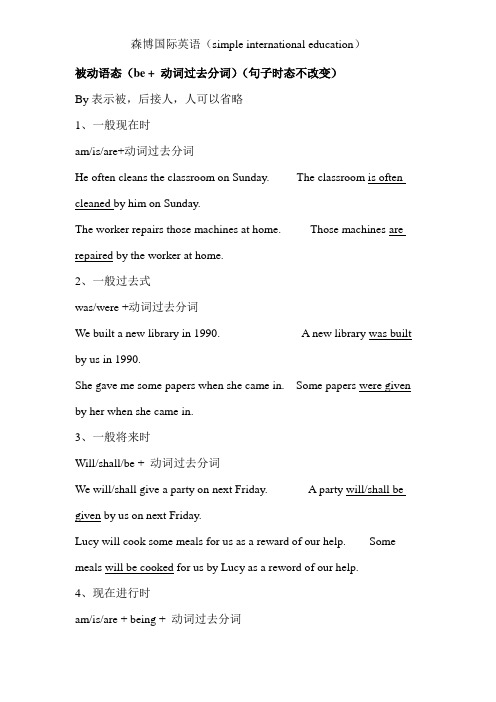
被动语态(be + 动词过去分词)(句子时态不改变)By表示被,后接人,人可以省略1、一般现在时am/is/are+动词过去分词He often cleans the classroom on Sunday. The classroom is often cleaned by him on Sunday.The worker repairs those machines at home. Those machines are repaired by the worker at home.2、一般过去式was/were +动词过去分词We built a new library in 1990. A new library was built by us in 1990.She gave me some papers when she came in. Some papers were given by her when she came in.3、一般将来时Will/shall/be + 动词过去分词We will/shall give a party on next Friday. A party will/shall be given by us on next Friday.Lucy will cook some meals for us as a reward of our help. Some meals will be cooked for us by Lucy as a reword of our help.4、现在进行时am/is/are + being + 动词过去分词The manager is making a working plan in his office, so don't disturb him.A working plan is being made by the manager, so don't disturb him.5、过去进行时was/were + being + 动词过去分词They were talking about a new movie when I entered the room. A new movie was being talked by them when I entered the room.6、现在完成时Has/have + been + 动词过去分词Our country has introduced more new technologies since the reform and opening policy.More new technologies have been introduced by our country since the reform and opening policy.7、过去完成时Had + been + 动词过去分词I had learned 5000 words by the age of 15. 5000 words had been learned by me by the age of 15.虚拟语气:由if,wish 等词引导,虚拟部分时态要比句子时态向前推一个,即与现在相反的假设,虚拟部分用过去式;与过去式相反的,虚拟部分用过去完成时I will I were _____________ If I were you, I would go aboard.If I had finished these work yesterday, I would have go for a picnic now.。
九年级上册英语第一次月考知识点
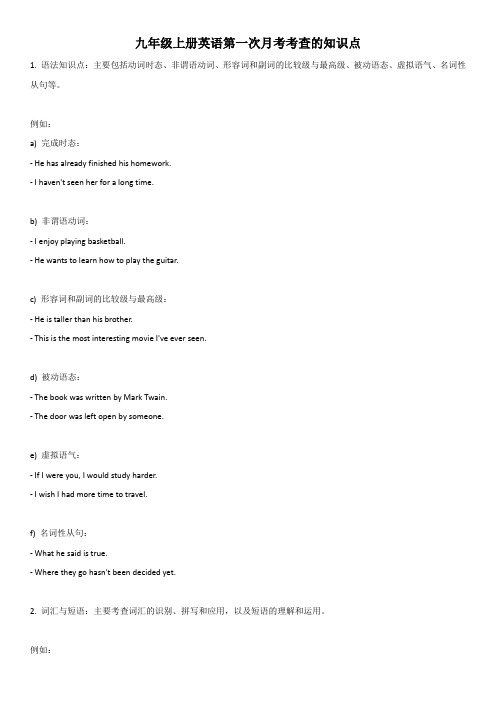
九年级上册英语第一次月考考查的知识点1. 语法知识点:主要包括动词时态、非谓语动词、形容词和副词的比较级与最高级、被动语态、虚拟语气、名词性从句等。
例如:a) 完成时态:- He has already finished his homework.- I haven't seen her for a long time.b) 非谓语动词:- I enjoy playing basketball.- He wants to learn how to play the guitar.c) 形容词和副词的比较级与最高级:- He is taller than his brother.- This is the most interesting movie I've ever seen.d) 被动语态:- The book was written by Mark Twain.- The door was left open by someone.e) 虚拟语气:- If I were you, I would study harder.- I wish I had more time to travel.f) 名词性从句:- What he said is true.- Where they go hasn't been decided yet.2. 词汇与短语:主要考查词汇的识别、拼写和应用,以及短语的理解和运用。
例如:a) 词汇:- She wrote a letter to her friend.- Can you spell this word correctly?b) 短语:- Turn off the lights when you leave the room.- He is always ahead of others in class.3. 阅读理解:主要考查对文章的理解能力和阅读技巧,包括细节理解、推理判断和主旨把握等。
英语语法练习中的虚拟语气与被动语态应用
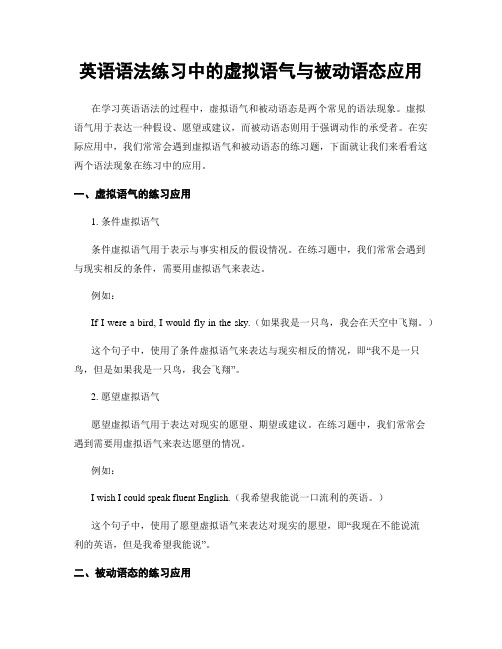
英语语法练习中的虚拟语气与被动语态应用在学习英语语法的过程中,虚拟语气和被动语态是两个常见的语法现象。
虚拟语气用于表达一种假设、愿望或建议,而被动语态则用于强调动作的承受者。
在实际应用中,我们常常会遇到虚拟语气和被动语态的练习题,下面就让我们来看看这两个语法现象在练习中的应用。
一、虚拟语气的练习应用1. 条件虚拟语气条件虚拟语气用于表示与事实相反的假设情况。
在练习题中,我们常常会遇到与现实相反的条件,需要用虚拟语气来表达。
例如:If I were a bird, I would fly in the sky.(如果我是一只鸟,我会在天空中飞翔。
)这个句子中,使用了条件虚拟语气来表达与现实相反的情况,即“我不是一只鸟,但是如果我是一只鸟,我会飞翔”。
2. 愿望虚拟语气愿望虚拟语气用于表达对现实的愿望、期望或建议。
在练习题中,我们常常会遇到需要用虚拟语气来表达愿望的情况。
例如:I wish I could speak fluent English.(我希望我能说一口流利的英语。
)这个句子中,使用了愿望虚拟语气来表达对现实的愿望,即“我现在不能说流利的英语,但是我希望我能说”。
二、被动语态的练习应用被动语态用于强调动作的承受者,而不是执行者。
在练习题中,我们常常会遇到需要转换为被动语态的句子。
例如:The book was written by Mark Twain.(这本书是马克·吐温写的。
)这个句子中,使用了被动语态来强调动作的承受者,即“这本书是被马克·吐温写的”。
被动语态还可以用于强调某个事物的重要性或普遍性。
例如:English is spoken all over the world.(英语在世界各地都被使用。
)这个句子中,使用了被动语态来强调英语的普遍性,即“英语被全世界使用”。
三、虚拟语气与被动语态的综合应用在练习题中,我们还经常会遇到虚拟语气和被动语态的综合应用,需要根据语境进行分析和判断。
语法进阶讲解小学六年级被动语态与虚拟语气

语法进阶讲解小学六年级被动语态与虚拟语气在小学六年级的语法学习中,被动语态与虚拟语气是比较复杂的语法知识点,需要同学们有一定的基础才能够理解和掌握。
本文将对小学六年级被动语态与虚拟语气进行进阶讲解,帮助同学们更好地掌握这些知识。
被动语态(Passive Voice)一、被动语态的构成被动语态由助动词be(am、is、are、was、were等)加上及物动词的过去分词形式构成。
例如:- 主动语态:Tom eats an apple.- 被动语态:An apple is eaten by Tom.在被动句中,动作的承受者(即主语)成为句子的主语,而动作的执行者(即宾语)变成句子的宾语,通过be动词与过去分词进行连结。
二、被动语态的应用场景被动语态常用于以下情况:1. 当不知道或者没有必要提及执行者时。
例如:The book was written in 1920.(书是在1920年写的。
)2. 当强调动作的承受者时。
例如:The cake was made by my mom.(这个蛋糕是我妈妈做的。
)3. 当背景描述中的主语变化时。
例如:The trees were chopped down by the workers.(树木被工人们砍伐。
)三、被动语态的形式转换在使用被动语态时,需要注意主动语态中的主语是否为第三人称单数。
如果是,则be动词需要变成is或者was;如果不是,则使用are或者were。
四、被动语态的时态转换在将主动语态转换为被动语态时,需要同时改变时间和人称。
例如:- 主动语态:He cleans the room.(他打扫房间。
)- 被动语态:The room is cleaned by him.(房间被他打扫。
)虚拟语气(Subjunctive Mood)一、虚拟语气的构成虚拟语气用于表达与事实相反、与现实不符或者只是一种假设的情况。
在英语中,虚拟语气主要通过动词的形态和结构来表示。
be being done 的用法

be being done 的用法用法解析:be being done•用法一:进行时态的被动语态•用法二:虚拟语气中的被动形式用法一:进行时态的被动语态格式主语 + be(am/is/are) being done + 宾语解释在进行时态中,当需要表达一个动作正在被执行,并且主语是被动的,即主语是动作的承受者时,我们可以使用“be being done”的形式。
例如:The dinner is being cooked (晚餐正在被做)。
例句1.The report is being written by Tom. (这份报告正在被汤姆写)2.The film is being shot in Paris. (这部电影正在巴黎拍摄)3.The house is being renovated. (这栋房子正在装修)用法二:虚拟语气中的被动形式格式主语 + should/ought to be being done + 宾语解释在虚拟语气中,当需要表达某个动作本应该正在被执行,但事实上并没有被执行时,我们可以使用“should/ought to be being done”的形式。
例如:The room should be being cleaned (房间应该正在被打扫)。
例句1.The documents should be being reviewed by now. (这些文件现在应该正在被审核)2.The children ought to be being supervised. (孩子们应该正在被看管)3.The repairs should be being made as we speak. (修理工作应该正在进行中)以上是关于“be being done”的用法解析。
通过进行时态的被动语态和虚拟语气中的被动形式,我们可以准确地表达出动作正在被执行的情况,或者某个动作本应该正在被执行的情况。
被动语态 虚拟语气
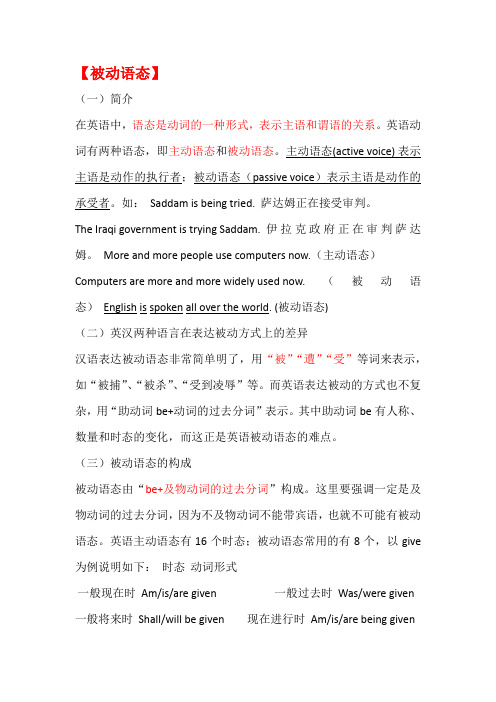
【被动语态】(一)简介在英语中,语态是动词的一种形式,表示主语和谓语的关系。
英语动词有两种语态,即主动语态和被动语态。
主动语态(active voice) 表示主语是动作的执行者;被动语态(passive voice)表示主语是动作的承受者。
如: Saddam is being tried. 萨达姆正在接受审判。
The Iraqi government is trying Saddam. 伊拉克政府正在审判萨达姆。
More and more people use computers now.(主动语态)Computers are more and more widely used now.(被动语态) English is spoken all over the world. (被动语态)(二)英汉两种语言在表达被动方式上的差异汉语表达被动语态非常简单明了,用“被”“遭”“受”等词来表示,如“被捕”、“被杀”、“受到凌辱”等。
而英语表达被动的方式也不复杂,用“助动词be+动词的过去分词”表示。
其中助动词be有人称、数量和时态的变化,而这正是英语被动语态的难点。
(三)被动语态的构成被动语态由“be+及物动词的过去分词”构成。
这里要强调一定是及物动词的过去分词,因为不及物动词不能带宾语,也就不可能有被动语态。
英语主动语态有16个时态;被动语态常用的有8个,以give 为例说明如下:时态动词形式一般现在时 Am/is/are given 一般过去时 Was/were given一般将来时 Shall/will be given 现在进行时 Am/is/are being given过去进行时 Was/were being given 过去完成时 Had been given过去将来时 Should/would be given现在完成时 Has/have been given 被动语态的疑问句是将第一个助动词移到主语之前、句末用问号;否定式是在第一个助动词后加not或never等否定词、句末用句号。
练习题-虚拟语气+被动语态

一、虚拟语气:1.If people more slowly, there wouldn’t be so many accidents.A.should driveB. driveC. droveD. will drive2.Tom said that if he how it worked, he me what to do.A.knows; would tellB. had known; would have toldC. knew; would have toldD. had known; would tell3.The lecture bored me to death last night. I wish I it.A.had not attendedB. have not attendedC. did not attendD. can not have attended4.If it rain, the crops would be saved.A.willB. didC. shallD. should5.But for the snow, we the mountain yesterday.A.could have climbedB. could climbC. would climbD. had climbed6.He didn’t get up earlier this morning. Otherwise, he the first bus.A.would catchB. were to catchC. would have caughtD. must have caught7.My suggestion is that we get more people to attend the conference.A.shouldB. shallC. mustD. will8.It is required that students not smoke in the school.A.mustB. willC. shallD. should9.He telephoned to inform me of your birthday, or I nothing about it.A.knewB. had knownC. would have knownD. can have known10.A man who stopped drinking water be dead in about seven days.A.wouldB. willC. shallD. must11.If you had asked him yesterday, you what to do now.A.will knowB. can knowC. must knowD. would know12.---should I tell Mr Wang about the broken window?---It’s necessary before it rains.A.that he knowsB. his knowingC. he knowD. he has known13.---He in the exam last time.---Luckily he followed your advice.A.might failB. may failC. didn’t failD. would have failed14.---Why didn’t you go to see the film last night?---If I hadn’t been tired, I .A.wouldB. willC. would haveD. must have15.---I had lent my car to John and I had to take the bus.--- , we would have picked you up.A.Had we knownB. We had known itC. If we were knownD. If we know16.you miss the film tonight, you would feel sorry for it.A.WereB. ShouldC. WillD. If17.It’s high time that we students even harder at our lessons as the final examination isdrawing near.A.workB. will workC. workedD. have to work18.Although the little boy had been suffering from the serious disease, he acted as if nothing to him.A.happenedB. would happenC. was happenedD. had happened19.to take the exam tomorrow, I would go to the picnic with you.A.Were I notB. Weren’t IC. Should I notD. Had I not20.It’s a pity that he fail the exam.A.mightB. needC. shouldD. would21.He failed again, if only he your advice.A.followedB. would followC. had followedD. should follow22.The old man’s pale face suggested he dead.A.isB. wasC. should beD. be23.---If he , he that food.---Luckily he was sent to the hospital immediately.A. was warned; would not takeB. had been warned; would not have takenC. would be warned; had not takenD. would have been warned; had not taken24. To tell the truth, I would rather I the pain instead of her. You don’t know how worried I was.A. tookB. had takenC. have takenD. should have taken25. As a student, I have to take so many exams. How I wish I a teacher.A. amB. wereC. will beD. had been26. During the tough days they gave me shelter and food, without which I of hunger and cold.A. would be diedB. would have diedC. would dieD. will have died27. She took care of the girl she were he own daughter.A. becauseB. as thoughC. forD. even though28. ---Shall the bike be repaired by him?---No, I’d rather he it .A.will have; repairB. has; repairC. had; repairedD. has; repairedB.29. The government ordered spitting on the streets.A. was prohibitedB. is prohibitedC. be prohibitedD. be prohibiting30. I’d like to have given you a valuable present for your birthday, but I our of money.A. runsB. have runC. am runningD. ran二、被动语态1.---The room is dirty.---I know. It for weeks.A.hasn’t cleanedB. didn’t cleanedC. wasn’t cleanedD. hasn’t been cleaned2.The cloth well and long.A.washes; lasts B is washed; lasted C. washes; is lasted D. is washing; lasting3.---Tom has just left here.---I would have come in time to meet him, but I in the traffic jam.A.had been caughtB. was caughtC. was being caughtD. have been caught4.No decision about building a new school until all the problems have been discussed at themeeting.A.will be madeB. is madeC. is being made D has been made5.Ice will change into water if it .A.heatsB. is heatedC. is heatingD. will be heated6.The letter is very important, so it is supposed as soon as possible.A.to be sentB. to sendC. being sentD. sending7.I can’t go to the party with you because I have a lot of work .A.to doB. to be doneC. doneD. dong8.He as a national hero for his contribution to his motherland.A.regardedB. was regardedC. has regardedD. had been regarded9.Mary, hurry up or you won’t have time to before going out.A.get changedB. get changeC. get changingD. get to change10.The old must , especially while they are ill.A.take good careB. take good care ofC. be taken good careD. be taken good care of11.Do I have to take this medicine? It so terrible.A.tastesB. is tastingC. is tastedD. has tasted12.All the employees except the manager to work on line at home.A.encouragesB. encourageC. is encouragedD. are encouraged13.These vegetables need .A.to waterB. wateredC. being wateredD. watering14.If she invited earlier, she would have gone there.A.wasB. has beenC. had beenD. had15.The sports meet next week is sure to be a great success.A.to take placeB. to be taken placeC. to have taken placeD. being taken place16.When and where to build the new factory yet.A.hasn’t been decidedB. are not decidedC. has not decidedD. have not decided17.The children were so noisy that I had to shout at the top of my voice .A.to be heardB. to have heardC. hearingD. being heard18.Some animals and killed at such a speed that they will disappear from the earth in the nearfuture.A.huntedB. are huntedC. are being huntedD. had been hunted19.The newly-bought pen smoothly.A.is writtenB. writesC. was writtenD. has been writing20.The film a second time.A.is well worth seenB. is well worth seeingC. is worthy to seeD. is worthy of seeing21.She her sister in appearance but not in character.A.is resembledB. is resemblingC. resembles D resembled22.--- What about the interview today?---Some questions are difficult .A.answeredB. to be answeredC. to answerD. answering23.He said that the bridge by the end of July.A.would completeB. would be completedC. would have been completedD. was completed24.Hundreds of people every year by traffic on the roads.A.get killB. are getting killedC. get killingD. get killed25.---Hello! I have a letter , but I am busy now. Will you please post it for me?---With pleasure.A.to postB. postedC. posting D to be posted26.In the film, the battle is made in winter.A.to take placeB. to be taken placeC. take placeD. taking place.27.It sounds a good idea, but is remains whether it will success.A.to seeB. to be seenC. seeingD. seen28.that she can pass the written exam this time.A.That is hopedB. It’s hopedC. That hopesD. It hopes29.The red car there Tom’s mother.A.is belonging toB. is belonged toC. belongs toD. belonging to30.The surface of the table smooth enough.A.hasn’t feltB. doesn’t feelC. is feelingD. isn’t feel.。
英语被动语态+虚拟语气
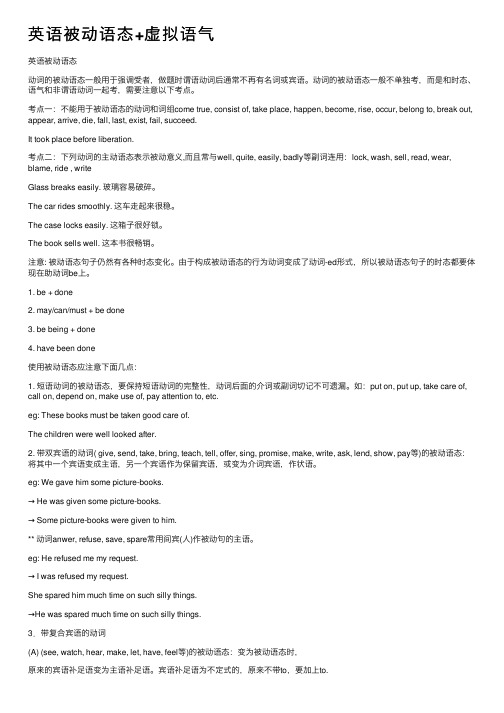
英语被动语态+虚拟语⽓英语被动语态动词的被动语态⼀般⽤于强调受者,做题时谓语动词后通常不再有名词或宾语。
动词的被动语态⼀般不单独考,⽽是和时态、语⽓和⾮谓语动词⼀起考,需要注意以下考点。
考点⼀:不能⽤于被动语态的动词和词组come true, consist of, take place, happen, become, rise, occur, belong to, break out, appear, arrive, die, fall, last, exist, fail, succeed.It took place before liberation.考点⼆:下列动词的主动语态表⽰被动意义,⽽且常与well, quite, easily, badly等副词连⽤:lock, wash, sell, read, wear, blame, ride , writeGlass breaks easily. 玻璃容易破碎。
The car rides smoothly. 这车⾛起来很稳。
The case locks easily. 这箱⼦很好锁。
The book sells well. 这本书很畅销。
注意: 被动语态句⼦仍然有各种时态变化。
由于构成被动语态的⾏为动词变成了动词-ed形式,所以被动语态句⼦的时态都要体现在助动词be上。
1. be + done2. may/can/must + be done3. be being + done4. have been done使⽤被动语态应注意下⾯⼏点:1. 短语动词的被动语态,要保持短语动词的完整性,动词后⾯的介词或副词切记不可遗漏。
如:put on, put up, take care of, call on, depend on, make use of, pay attention to, etc.eg: These books must be taken good care of.The children were well looked after.2. 带双宾语的动词( give, send, take, bring, teach, tell, offer, sing, promise, make, write, ask, lend, show, pay等)的被动语态:将其中⼀个宾语变成主语,另⼀个宾语作为保留宾语,或变为介词宾语,作状语。
初中语法复习被动语态与虚拟语气
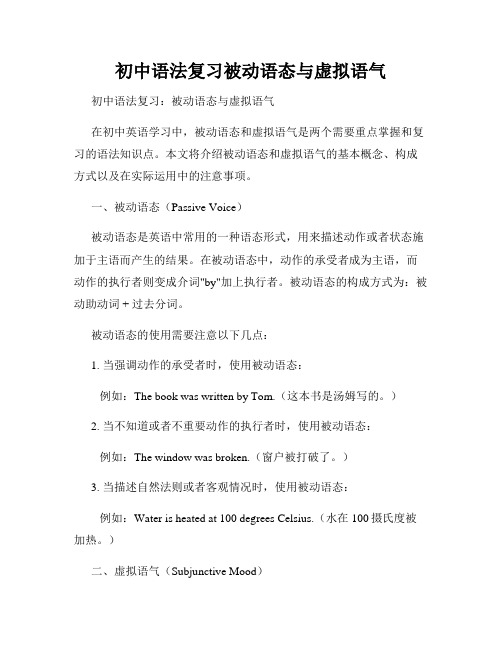
初中语法复习被动语态与虚拟语气初中语法复习:被动语态与虚拟语气在初中英语学习中,被动语态和虚拟语气是两个需要重点掌握和复习的语法知识点。
本文将介绍被动语态和虚拟语气的基本概念、构成方式以及在实际运用中的注意事项。
一、被动语态(Passive Voice)被动语态是英语中常用的一种语态形式,用来描述动作或者状态施加于主语而产生的结果。
在被动语态中,动作的承受者成为主语,而动作的执行者则变成介词"by"加上执行者。
被动语态的构成方式为:被动助动词 + 过去分词。
被动语态的使用需要注意以下几点:1. 当强调动作的承受者时,使用被动语态:例如:The book was written by Tom.(这本书是汤姆写的。
)2. 当不知道或者不重要动作的执行者时,使用被动语态:例如:The window was broken.(窗户被打破了。
)3. 当描述自然法则或者客观情况时,使用被动语态:例如:Water is heated at 100 degrees Celsius.(水在100摄氏度被加热。
)二、虚拟语气(Subjunctive Mood)虚拟语气是英语中用来表达假设、愿望、建议、要求等非真实情况的一种语气形式。
虚拟语气的构成方式多种多样,下面将介绍几种常见的虚拟语气用法。
1. 虚拟语气用于假设情况下:当表达与现实事实相反的假设情况时,通常使用"were"代替"was",并配合动词的原型形式。
例如:If I were you, I would study harder.(如果我是你,我会更加努力学习。
)2. 虚拟语气用于愿望或者建议:当表达对现实的愿望或者建议时,使用"should"或者"would"加动词的原型形式。
例如:I wish she would come to my party.(我希望她能来参加我的聚会。
语法专题7—被动语态和虚拟语气

12. I’m not sure they might ask Tom to speak at the meeting. ----I’m not sure Tom might be asked to speak at the meeting.
在学习被动语态中要注意的问题
在上面我们已经初步了解了被动语态的构成和主动变被动的方问题。
I: 一些使役动词(let, have, make等)或感观动词(see, hear, watch, notice等)
在主动语态中后面接的动词不定式不带to,但改为被动语态时,要
C. The teacher let them leave the classroom after class.
D.
---They were let to leave the classroom by the teacher after class.
D. We hear her sing in the room every day.
4. 过去将来时态中被动语态的构成: would be + pp 或 was/were going to be + pp
The manager said the project would be completed soon. =The manager said the project was going to be completed soon.
2) 连系动词或者说是五觉动词没有被动语态 因为连系动词或者说是五觉动词属于不及物动词 如:look, sound, smell, feel, taste 这些动词 This apple is tasted nice. 是错误的。 正确的是:This apple tastes nice.
高考英语:写作中的高级表达+妙记11+用途各异的被动语态、虚拟语气、倍数和比较句型

妙记11 用途各异的被动语态、虚拟语气、倍数和比较句型被动语态、虚拟语气、倍数和比较句型等在书面表达中都属于高级句式,它们的合理运用都能给文章增色添彩。
一、用英文思维的被动语态英文中被动语态的使用比汉语更多、更普遍。
一般说来,当强调动作的承受者、不必说出动作的执行者或执行者不明确时,多用被动语态。
被动语态因为更突出客观事实而被广泛使用。
所以同学们在写作时也应该注意多用被动语态,以赢得更高的分数。
1.主动语态变被动语态①We can borrow at most five books at a time, and we can keep them for ten days.→At most five books can be borrowed at a time and they can be kept for ten days.②When we put some waste chemicals into the sea, they can hurt or kill animals and fish.→When some waste chemicals are put into the sea, they can hurt or kill animals and fish.2.写作中常见的被动语态(1)be+过去分词(be可使用各种时态)①The exhibition will be held from 9:00 am to 5:00 pm the day after tomorrow in the artgallery.(2017·全国卷Ⅱ书面表达)展览将于后天上午9时至下午5时在美术馆举行。
②Nowadays, more and more English words are being used in the Chinese language.(2014·江苏高考书面表达)当今,越来越多的英语词汇正在汉语中使用。
中考被动语态与虚拟语气中的时态与语态转换
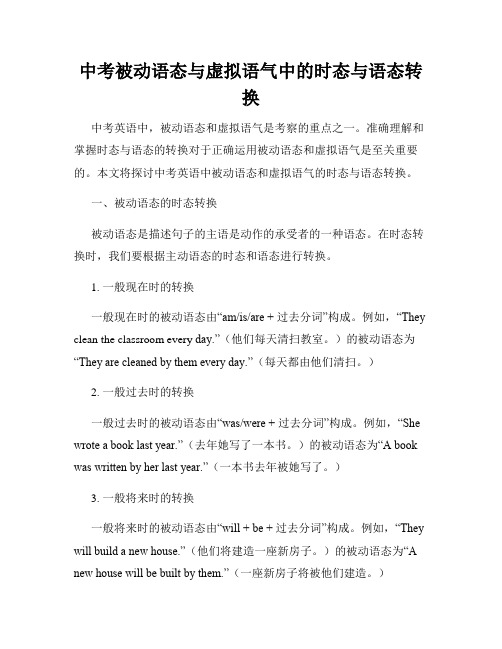
中考被动语态与虚拟语气中的时态与语态转换中考英语中,被动语态和虚拟语气是考察的重点之一。
准确理解和掌握时态与语态的转换对于正确运用被动语态和虚拟语气是至关重要的。
本文将探讨中考英语中被动语态和虚拟语气的时态与语态转换。
一、被动语态的时态转换被动语态是描述句子的主语是动作的承受者的一种语态。
在时态转换时,我们要根据主动语态的时态和语态进行转换。
1. 一般现在时的转换一般现在时的被动语态由“am/is/are + 过去分词”构成。
例如,“They clean the classroom every day.”(他们每天清扫教室。
)的被动语态为“They are cleaned by them every day.”(每天都由他们清扫。
)2. 一般过去时的转换一般过去时的被动语态由“was/were + 过去分词”构成。
例如,“She wrote a book last year.”(去年她写了一本书。
)的被动语态为“A book was written by her last year.”(一本书去年被她写了。
)3. 一般将来时的转换一般将来时的被动语态由“will + be + 过去分词”构成。
例如,“They will build a new house.”(他们将建造一座新房子。
)的被动语态为“A new house will be built by them.”(一座新房子将被他们建造。
)4. 现在进行时的转换现在进行时的被动语态由“am/is/are + being + 过去分词”构成。
例如,“He is painting the wall now.”(他正在刷墙。
)的被动语态为“The wallis being painted by him now.”(墙正在被他刷。
)5. 过去进行时的转换过去进行时的被动语态由“was/were + being + 过去分词”构成。
例如,“They were cleaning the house yesterday.”(昨天他们正在打扫房间。
语法3-虚拟语气

3.与将来事实相反
1. Everybody would be very happy if the hot
summer were to be finished tomorrow. 2.If I were to fail my Maths test, I would have to take it again at the end of the term. 3.If he should come tomorrow, I would talk to him about it. 4.If he should come tomorrow, I would talk to him about it. 5.If I were to go abroad, I would go to France. 6.If it should rain tomorrow, our picnic would be put off.
1、if条件句中的虚拟语气
2)if虚拟条件句
条件从句 与现在事实相反 过去式 did/were 与过去事实相反 与将来事实相反
had+过去分词
结果主句
would/should/could/ might+动词原形
would/should/could/might+ have 过去分词
were+不定式 would/should/could/ should +动词原形 might+动词原形
动词被动语态要点回顾
ቤተ መጻሕፍቲ ባይዱ
据说…… It is said that … 据报导…… It is reported that … 据推测…… It is supposed that … 希望…… It is hoped that … 众所周知…… It is well known that …
虚拟语气,被动语态详解

虚拟语气,被动语态详解1 语气(mood)语气是动词的一种形式,表示说话人对某一行为或事情的看法和态度。
2 语气的种类⑴、陈述语气:表示动作或状态是现实的、确定的或符合事实的,用于陈述句、疑问句和某些感叹句。
如:①There are two sides to every question.每个问题都有两个方面。
②Were you busy all day yesterday?昨天一整天你都很忙吗?③How good a teacher she is!她是多好的一位老师啊!⑵、祈使语气:表示说话人对对方的请求或命令。
如:①Never be late again!再也不要迟到了。
②Don’t forget to turn off the light.别忘了关灯。
⑶、虚拟语气:表示动作或状态不是客观存在的事实,而是说话人的主观愿望、假设或推测等。
如:①If I were a bird, I could fly in the air.如果我是一只小鸟,我就能在空中飞行。
②I wish I could pass the examination.我希望我能通过考试。
③May you succeed!祝您成功!虚拟语气在语法里算得上是个难点。
让我们就从最简单的开始吧。
第二部分:简单句中的虚拟语气一、情态动词的过去式用于现在时态时,表示说话人的谦虚、客气、有礼貌、或委婉的语气,常用于日常会话中。
如:⑴.Would you be kind enough to show me the way to the post office?请你告诉我去邮局的路好吗?⑵.It would be better for you not to stay up too late.你最好别熬夜到很晚。
二、表祝愿。
1、常用“may+动词原形”表示祝愿,但愿,此时may须置于句首(多用于正式文体中)。
⑴、May good luck be yours!祝你好运!⑵、May you be happy!祝你快乐!⑶、May you do even better!祝你取得更大成就!⑷、May you have a good time. 祝愿你玩的痛快。
- 1、下载文档前请自行甄别文档内容的完整性,平台不提供额外的编辑、内容补充、找答案等附加服务。
- 2、"仅部分预览"的文档,不可在线预览部分如存在完整性等问题,可反馈申请退款(可完整预览的文档不适用该条件!)。
- 3、如文档侵犯您的权益,请联系客服反馈,我们会尽快为您处理(人工客服工作时间:9:00-18:30)。
【被动语态】(一)简介在英语中,语态是动词的一种形式,表示主语和谓语的关系。
英语动词有两种语态,即主动语态和被动语态。
主动语态(active voice)表示主语是动作的执行者;被动语态(passive voice)表示主语是动作的承受者。
如:Saddam is being tried.萨达姆正在接受审判。
The Iraqi government is trying Saddam.伊拉克政府正在审判萨达姆。
More and more people use computers now.(主动语态)Computers are more and more widely used now.(被动语态)English is spoken all over the world.(被动语态)(二)英汉两种语言在表达被动方式上的差异汉语表达被动语态非常简单明了,用“被”“遭”“受”等词来表示,如“被捕”、“被杀”、“受到凌辱”等。
而英语表达被动的方式也不复杂,用“助动词be+动词的过去分词”表示。
其中助动词be有人称、数量和时态的变化,而这正是英语被动语态的难点。
(三)被动语态的构成被动语态由“be+及物动词的过去分词”构成。
这里要强调一定是及物动词的过去分词,因为不及物动词不能带宾语,也就不可能有被动语态。
英语主动语态有16个时态;被动语态常用的有8个,以give 为例说明如下:时态动词形式一般现在时Am/is/are given一般过去时Was/were given 一般将来时Shall/will be given现在进行时Am/is/are being given 过去进行时Was/were being given过去完成时Had been given过去将来时Should/would be given 现在完成时Has/have been given 被动语态的疑问句是将第一个助动词移到主语之前、句末用问号;否定式是在第一个助动词后加not或never等否定词、句末用句号。
Be+主+done+其?主+be not/never+done+其。
“During the interview,were you asked questions in English?”“No,I wasn’t asked questions in English.”“面试的时候,用英语问你问题了吗?”“没有,没有用英语问我问题。
”The origin of the universe will probably never be explained.宇宙的起源大概永远也不会被解释清楚。
Is the restaurant being decorated?那家餐馆正在装修吗?The restaurant is not being decorated.In fact the restaurant has never b een decorated。
那家餐馆没有在装修。
实际上,那家餐馆从来没有装修过。
(四)被动语态的用法1、不知道或没有必要指出动作的执行者。
换个说法,有一件事情不知道是谁干的或者不想说出是谁干的,这时就用被动语态。
例如:I felt a littlie nervous when I was being interviewed.我接受面试的时候,有点紧张。
These fighters are imported from Russia.这些战斗机是从俄国进口的。
That place has been turned into a swimming pool.那个地方已被变成游泳池。
2、说话或发表意见时,为了显得客观公正,也常用被动语态He’s said/believed/reported to be in the U.S.A.据说/据信/据报道他在美国。
还有下列常用句型(that后面跟句子):It is said that…….据说It is hoped that…….希望It is reported that…….据报道It is believed that…….人们相信It is announced that…….据宣布it is(well)known that…….众所周知It has been decided that…….已经决定It is supposed that…….人们认为It is suggested that…….有人建议It must be remembered that…….务必记住It is taken for granted that…….被视为当然(五)主动句变被动句的注意事项一是时态不能改变;二是变为被动语态后,谓语动词要和被动语态的主语在人称、数上保持一致。
还要作如下变动:把主动语态的宾语变为被动语态的主语;主动语态的主语放在by的后面,组成介词短语,再把这个介词短语放在被动语态的谓语动词之后。
在动作的执行者无须说明或不必要强调时,by短语可以省略。
例如:They will open a new supermarket there soon.他们很快将在那里开办个新超市。
A new supermarket will be opened there soon.一个新超市不久将在那里开办。
The doctor gave two lectures in English.那位医生用英语讲了两次课。
Two lectures were given by the doctor in English.由那位医生用英语讲了两次课。
Somebody has warned us to be careful of rats.有人警告我们要当心老鼠。
We have been warned to be careful of rats.我们受到警告,要当心老鼠。
如果主动语态有两个宾语(直接宾语和间接宾语),变为被动语态时,可将其中任何一个宾语变为主语,另一个不变。
但较常见的是将间接宾语变为被动语态的主语。
The reporters asked the president some questions.记者们问了总统一些问题。
The president was asked some questions by the reporters.(变间接宾语为主语)Some questions were asked the president by the reporters.(变直接宾语为主语)We have given him a job.我们已给了他一个工作。
He has been given a job.(变间接宾语为主语)A job has been given(to)him.(变直接宾语为主语)(六)含有情态动词的被动语态句中含有情态动词时,其被动语态的结构是:情态动词+be+过去分词:The timetable can be changed any time.时间表随时可以改变。
This book may not be taken out of the reading room.这本书不允许带出阅览室。
This dictionary must be taken good care of.这本词典必须保管好。
(七)关于被动语态的几点说明1、有些动词形式上是主动,意义上是被动。
例如:School begins in September.学校九月份开学。
The library doesn’t open on Sunday.图书馆星期天不开放。
The machine runs well.这台机器容易操作。
My pen writes well.我的钢笔好使。
The cloth washes well.这料子耐洗。
The dictionary sells well.这词典销路很好。
The book hardly sells.这书买不出去。
The door will not shut/lock.门关/锁不上。
2、make,see,watch,hear,notice,feel等使役动词和感官动词的宾语后面可以接不带to的不定式作宾补。
但在被动语态中,不定式符号to必须补上。
例如:They made him go.他们让他去。
He was made to go.他被要求去了。
I heard him say good-bye to his friends.我听见他向他的朋友说再见。
He was heard to say good-bye to his friends.有人听到他向他的朋友说再见。
3、除助动词be外,动词get有时也可跟过去分词构成被动语态,是比较口语化的一种被动语态。
这种结构中很少用by短语。
例如:I got lost in the huge market.在那个巨大的市场中我迷失了方向。
You might get killed/hurt.你会送命/受伤的。
In the end this story got translated into English.这故事最后被译成了英文。
His car got damaged in a road accident.他的车在交通事故中被毁了。
4、“have/get+宾语+过去分词”这个句型也表达了一种被动的意思。
如:I’ll have the bike repaired in no time.我一会就把自行车修好。
I had my wallet stolen/lost last Sunday when I was shopping.上星期天买东西的时候我的钱夹被盗。
He got his leg broken when playing football.踢足球的时候他把腿弄断了。
I bought these books at a discount and had two hundred dollars saved.我打折买了这些书,省了两百美元。
5、在need,want,require后面,主动的-ing形式表达被动的意思:My watch needs cleaning.(=…needs to be cleaned)我的表需要清洗。
Your garden needs watering.(=…to be watered)你的花园需要浇水。
Does your suit require pressing,sir?先生,您的衣服要烫吗?【虚拟语气】多数中国人对虚拟语气的理解是:虚拟语气表示说话人的愿望,是假设的,虚构的,与事实相反的,或者是不太可能的。
这种理解固然是对的,但并不全面。
在英语中,虚拟语气是个广义的概念,包括好几种句型和结构。
